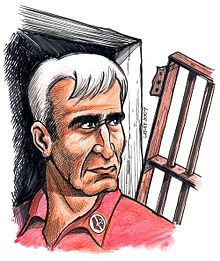
Back أحمد سعدات Arabic Ahmed Sadat Catalan Ahmad Sa'adat German احمد سعدات Persian Ahmad Sa’dat Finnish Ahmad Saadat French Ahmad Sa'adat Galician אחמד סעדאת HE Ahmad Sa'adat ID Ahmad Sa'dat Italian
Ahmad Sa'adat | |
|---|---|
أحمد سعدات | |
 Portrait by Carlos Latuff, 2009 | |
| General Secretary of the Popular Front for the Liberation of Palestine | |
| Assumed office 3 October 2001 | |
| Preceded by | Abu Ali Mustafa |
| Personal details | |
| Born | 1953 (age 71–72) al-Bireh, Jordanian West Bank |
| Nationality | Palestinian (Jordanian until 1988) |
| Political party | Popular Front for the Liberation of Palestine |
| Spouse | Abla Sa'adat |
| Children | 4 |
| Residence | Israel (in Israeli prison since 2006) |
| Palestinian nationalism Factions and leaders | ||
|---|---|---|
|
Map: Birthplaces or family origins Details below: p. parents from, b. born in, d. death. |
||
|
| ||
Ahmad Sa'adat (also transliterated from Arabic as Ahmed Sadat or Saadat; Arabic: أحمد سعدات; born 1953), also known as Abu Ghassan, is a Palestinian militant and Secretary-General of the Popular Front for the Liberation of Palestine (PFLP), a Marxist–Leninist Palestinian nationalist organisation.[1] Sa'adat graduated in 1975 from the UNRWA Teachers College, Ramallah, specializing in Mathematics. Sa'adat was elected General Secretary of the PFLP by its Central Committee in October 2001, to succeed Abu Ali Mustafa after his assassination by Israel during the Second Intifada. He has been sentenced to prison terms and held in prison since 2002.
Sa'adat had spent many years in Israeli prisons, on eight separate occasions. He was accused by Israel of organizing the assassination of Israeli tourism minister Rehavam Ze'evi, and took refuge in the Muqata'a headquarters of PLO leader Yassir Arafat, which was then besieged by Israel after Arafat refused to hand him over to Israel. As part of an agreement with Israel, Sa'adat was tried by the Palestinian National Authority (PNA) and imprisoned at the Jericho prison in 2002. In the Palestinian elections of January 2006, Sa'adat was elected to the Palestinian Legislative Council. On 14 March 2006, Hamas announced their intention to release Sa'adat from prison. The US and British team monitoring Jericho prison left, citing poor security conditions. On the same day, Israeli forces carried out Operation Bringing Home the Goods, taking Sa'adat and five other security prisoners into custody. In December 2008 he was given a 30-year prison sentence by an Israeli military court. He was held in solitary confinement in an Israeli prison and his health deteriorated after frequent hunger strikes in protest of Israeli policies.[2] Since 2012 Sa'adat is no longer in solitary confinement.[3]
- ^ "Militant group shuns Arafat". BBC. 2 February 2002. Archived from the original on 21 May 2021. Retrieved 27 June 2024.
- ^ Samhan, Amjad (12 September 2013). "Israel Prison Protest Continues: Hunger Strike at Critical Levels". Al Monitor. Archived from the original on 19 April 2015.
- ^ "Ahmad Sa'adat from prison: Mass movement needed for national unity and resistance". Samidoun. 5 August 2012. Archived from the original on 7 May 2021. Retrieved 21 August 2020.
